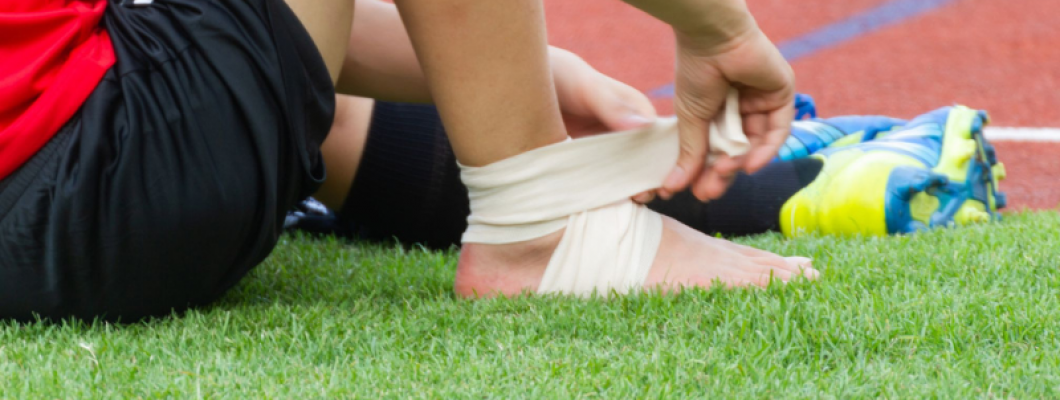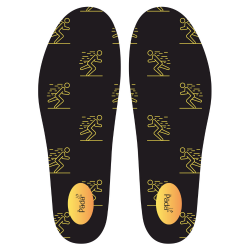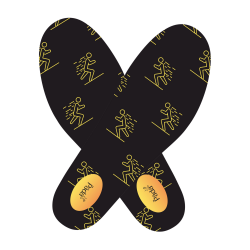03 Oct


Posted By
3 Comment(s)
247 View(s)
Outdoor sports are a great way to stay active and enjoy
nature, but they also come with a risk of injuries due to various factors such
as terrain, weather conditions, and the physical demands of the activities.
Whether you are hiking, biking, rock climbing, or playing sports like soccer or
tennis in an outdoor setting, it’s essential to be aware of common injuries and
how to prevent them. Here are some of the most common outdoor sports-related
injuries:
1. Sprains and Strains
- Cause:
Sudden movements, awkward landings, or overexertion.
- Impact:
Sprains (ligament injuries) and strains (muscle or tendon injuries) are
prevalent in outdoor sports, particularly in activities that involve
running or jumping. Symptoms include pain, swelling, and limited mobility.
- Prevention:
Proper warm-ups, strength training, and using appropriate footwear can
help reduce the risk of sprains and strains.
2. Fractures
- Cause:
Falls, collisions, or direct impact.
- Impact:
Fractures can occur in various outdoor activities, especially in high-risk
sports like rock climbing, mountain biking, or skateboarding. Symptoms
include severe pain, swelling, and an inability to use the affected limb.
- Prevention:
Wearing protective gear, understanding your limits, and using proper
techniques can help prevent fractures.
3. Knee Injuries
- Cause:
Twisting motions, sudden stops, or overuse.
- Impact:
Outdoor sports that involve running, jumping, or rapid direction changes
can lead to knee injuries, such as ACL tears, meniscus tears, or patellar
tendinitis. Symptoms may include pain, swelling, and instability.
- Prevention:
Strengthening the muscles around the knee, maintaining proper technique,
and allowing for adequate recovery can help reduce the risk of knee
injuries.
4. Ankle Injuries
- Cause:
Uneven terrain, sudden direction changes, or falls.
- Impact:
Ankle sprains are common in outdoor sports, particularly in hiking and
running. Symptoms include pain, swelling, and difficulty bearing weight.
- Prevention:
Wearing supportive footwear, strengthening ankle muscles, and being
cautious on uneven surfaces can help prevent ankle injuries.
5. Shoulder Injuries
- Cause:
Overuse, falls, or improper technique.
- Impact:
Outdoor sports such as rock climbing, kayaking, or throwing sports can
lead to shoulder injuries, including rotator cuff strains and shoulder
impingement. Symptoms may include pain, weakness, and limited range of
motion.
- Prevention:
Strengthening shoulder muscles, using proper techniques, and incorporating
rest days can help prevent shoulder injuries.
6. Heat-Related Illnesses
- Cause:
Exercising in high temperatures without proper hydration.
- Impact:
Heat exhaustion and heat stroke are serious conditions that can occur
during outdoor activities in hot weather. Symptoms include dizziness,
nausea, rapid heartbeat, and confusion.
- Prevention:
Staying hydrated, wearing appropriate clothing, and avoiding strenuous
activities during peak heat can help prevent heat-related illnesses.
7. Sunburn and Skin Injuries
- Cause:
Prolonged exposure to sunlight.
- Impact:
Outdoor sports expose individuals to UV radiation, leading to sunburn and
increasing the risk of skin cancer. Additionally, cuts, scrapes, and
abrasions can occur from falls or rough terrain.
- Prevention:
Applying sunscreen, wearing protective clothing, and being cautious in
rugged environments can help prevent skin injuries and sunburn.
8. Back Injuries
- Cause:
Poor lifting techniques, overexertion, or falls.
- Impact:
Back injuries can occur in outdoor sports, especially when lifting heavy
equipment or during activities that require twisting and bending. Symptoms
may include pain, stiffness, and limited mobility.
- Prevention:
Strengthening core muscles, maintaining good posture, and using proper
lifting techniques can help prevent back injuries.
9. Bicycle Injuries
- Cause:
Falls, collisions, or overuse.
- Impact:
Biking can lead to various injuries, including road rash, fractures, and
wrist sprains. Symptoms may include pain, swelling, and difficulty moving
the affected area.
- Prevention:
Wearing helmets and protective gear, following traffic rules, and
maintaining the bike in good condition can help reduce the risk of
bicycle-related injuries.
10. Tendon Injuries
- Cause:
Overuse or repetitive motions.
- Impact:
Tendon injuries, such as Achilles tendinitis and patellar tendinitis, can
occur in outdoor sports that involve running, jumping, or repetitive
actions. Symptoms may include pain and stiffness in the affected tendon.
- Prevention:
Gradually increasing activity intensity, incorporating rest days, and
using proper techniques can help prevent tendon injuries.



3 Comment(s)
Great insights! Thanks for sharing these helpful tips on fitness and muscle building. I've been researching safe ways to enhance my workout, and recently came across Prime Pharma anabolen kopen as a potential option. It’s interesting to see how quality supplements, like those from Prime Pharma, can complement a balanced fitness plan. If anyone's interested in learning more about quality anabolics, I found this resource really informative.
<ahref="https://disposablecartsuk.com/product/acapulco-gold-strain/" rel="dofollow">Acapulco Gold Strain</a>
<ahref="https://disposablecartsuk.com/product/afghani-strain/" rel="dofollow">Afghani strain</a>
<ahref="https://disposablecartsuk.com/product/ak-47-strain/" rel="dofollow">AK 47 Strain</a>
<ahref="https://disposablecartsuk.com/product/amnesia-haze-strain/" rel="dofollow">Amnesia Haze Strain</a>
<ahref="https://disposablecartsuk.com/product/blue-gelato-strain/" rel="dofollow">Blue Gelato Strain</a>
<ahref="https://disposablecartsuk.com/product/blueberry-muffin-strain/" rel="dofollow">Blueberry Muffin Strain</a>
<ahref="https://disposablecartsuk.com/product/bubblegum-popperz-strain/" rel="dofollow">Bubblegum Popperz Strain</a>
<ahref="https://disposablecartsuk.com/product/chemdawg-strain/" rel="dofollow">Chemdawg Strain</a>
<ahref="https://disposablecartsuk.com/product/diamond-dust-strain/" rel="dofollow">Diamond Dust Strain</a>
<ahref="https://disposablecartsuk.com/product/gary-payton-strain/" rel="dofollow">Gary Payton Strain</a>
<ahref="https://disposablecartsuk.com/product/miracle-alien-cookies-strain/" rel="dofollow">Miracle Alien Cookies Strain</a>
<ahref="https://disposablecartsuk.com/product/og-kush/" rel="dofollow">OG Kush</a>
<ahref="https://disposablecartsuk.com/product/permanent-marker-strain/" rel="dofollow">Permanent Marker Strain</a>
<ahref="https://disposablecartsuk.com/product/zoapscotti-strain/" rel="dofollow">Zoapscotti Strain</a>
<ahref="https://disposablecartsuk.com/product/blueberry-oil/" rel="dofollow">Blueberry Oil</a>
<ahref="https://disposablecartsuk.com/product/co%e2%82%82-extract-oil/" rel="dofollow">CO₂ Extract Oil</a>
<ahref="https://disposablecartsuk.com/product/delta-8-distillate/" rel="dofollow">Delta 8 Distillate</a>
<ahref="https://disposablecartsuk.com/product/d9-distillate/" rel="dofollow">Delta 9 Distillate</a>
<ahref="https://disposablecartsuk.com/product/delta-10-distillate/" rel="dofollow">DELTA-10 Distillate</a>
<ahref="https://disposablecartsuk.com/product/hhc-distillate/" rel="dofollow">HHC Distillate</a>
<ahref="https://disposablecartsuk.com/product/live-resin-oil/" rel="dofollow">Live Resin Oil</a>
<ahref="https://disposablecartsuk.com/product/purple-punch-oil/" rel="dofollow">Purple Punch oil</a>
<ahref="https://disposablecartsuk.com/product/raw-pure-thc-oil/" rel="dofollow">Raw (Pure) THC Oil</a>
<ahref="https://disposablecartsuk.com/product/rick-simpson-oil/" rel="dofollow">Rick Simpson Oil</a>
<ahref="https://disposablecartsuk.com/product/thc-clear-distillate/" rel="dofollow">THC Clear Distillate</a>
<ahref="https://disposablecartsuk.com/product/thc-d9-syrup/" rel="dofollow">THC Delta 9 Syrup</a>
<ahref="https://disposablecartsuk.com/product/star-killer-oil/" rel="dofollow">THC Star Killer Oil</a>
<ahref="https://disposablecartsuk.com/product/thca-distillate/" rel="dofollow">THCA Distillate</a>
<ahref="https://disposablecartsuk.com/product/thcp-distillate-oil/" rel="dofollow">THCP Distillate Oil</a>
<ahref="https://disposablecartsuk.com/product/whole-melt-extracts-2g-disposable/" rel="dofollow">Whole Melt Extracts 2g Disposable</a>
<ahref="https://disposablecartsuk.com/product/tre-house-hhc-live-resin-disposable-vape-pens-2grams/" rel="dofollow">Tre House HHC Live Resin Disposable Vape Pens (2grams)</a>
<ahref="https://disposablecartsuk.com/product/the-wizard-of-terps-1ml-syringe/" rel="dofollow">The Wizard Of Terps 1ml Syringe</a>
<ahref="https://disposablecartsuk.com/product/ruby-carts-disposable-vape-pen/" rel="dofollow">Ruby Carts Disposable Vape Pen</a>
<ahref="https://disposablecartsuk.com/product/potent-disposable/" rel="dofollow">Potent disposable</a>
<ahref="https://disposablecartsuk.com/product/packwoods-x-runtz/" rel="dofollow">Packwoods x Runtz</a>
<ahref="https://disposablecartsuk.com/product/ace-ultra-premium-disposable/" rel="dofollow">Ace Ultra Premium Disposable</a>
<ahref="https://disposablecartsuk.com/product/backpackboyz-carts/" rel="dofollow">Backpackboyz Carts</a>
<ahref="https://disposablecartsuk.com/product/baked-bar-2g-disposable/" rel="dofollow">Baked Bar 2g Disposable</a>
<ahref="https://disposablecartsuk.com/product/burst-2g-disposable-vape/" rel="dofollow">Burst 2g Disposable Vape</a>
<ahref="https://disposablecartsuk.com/product/cali-company-disposable-vape/" rel="dofollow">Cali Company Disposable Vape</a>
<ahref="https://disposablecartsuk.com/product/choice-lab-2g-disposable/" rel="dofollow">Choice Lab 2g Disposable</a>
<ahref="https://disposablecartsuk.com/product/clean-carts-2g-disposable/" rel="dofollow">Clean Carts 2G Disposable</a>
<ahref="https://disposablecartsuk.com/product/cookies-1g-disposable/" rel="dofollow">Cookies 1g Disposable</a>
<ahref="https://disposablecartsuk.com/product/family-high-range/" rel="dofollow">Family High Range</a>
<ahref="https://disposablecartsuk.com/product/favorites-2g-disposable/" rel="dofollow">Favorites 2G Disposable</a>
<ahref="https://disposablecartsuk.com/product/gassed-up-2g-disposable/" rel="dofollow">Gassed Up 2g Disposable</a>
<ahref="https://disposablecartsuk.com/product/jeeter-juice-carts/" rel="dofollow">Jeeter Juice Carts</a>
<ahref="https://disposablecartsuk.com/product/jungle-boys-vape/" rel="dofollow">Jungle Boys Vape</a>
<ahref="https://disposablecartsuk.com/product/seedless-disposable/" rel="dofollow">Seedless Disposable</a>
<ahref="https://englandtrap.com/product/apple-fritter-strain/" rel="dofollow">Apple Fritter Strain</a>
<ahref="https://englandtrap.com/product/biscotti-strain/" rel="dofollow">Biscotti Strain</a>
<ahref="https://englandtrap.com/product/blueberry-zkittlez-strain/" rel="dofollow">Blueberry Strain</a>
<ahref="https://englandtrap.com/product/cheese-kush/" rel="dofollow">Cheese strain</a>
<ahref="https://englandtrap.com/product/gelato-strain/" rel="dofollow">Gelato Strain</a>
<ahref="https://englandtrap.com/product/gg4-strain/" rel="dofollow">GG4 Strain</a>
<ahref="https://englandtrap.com/product/godfather-og-strain/" rel="dofollow">Godfather OG Strain</a>
<ahref="https://englandtrap.com/product/stardawg-strain/" rel="dofollow">Stardawg Strain</a>
<ahref="https://englandtrap.com/product/super-lemon-cherry-strain/" rel="dofollow">Super Lemon Cherry Strain</a>
<ahref="https://englandtrap.com/product/wedding-cake-strain-2/" rel="dofollow">Wedding Cake Strain</a>
<ahref="https://englandtrap.com/product/white-widow-strain/" rel="dofollow">White Widow Strain</a>
<ahref="https://englandtrap.com/product/girl-scout-cookies/" rel="dofollow">Girl Scout Cookies</a>
<ahref="https://englandtrap.com/product/granddaddy-purple-gdp-strain/" rel="dofollow">Granddaddy Purple Strain</a>
<ahref="https://englandtrap.com/product/ice-cream-cake-strain/" rel="dofollow">Ice Cream Cake Strain</a>
<ahref="https://englandtrap.com/product/master-kush/" rel="dofollow">Master Kush</a>
<ahref="https://englandtrap.com/product/northern-lights/" rel="dofollow">Northern Lights strain</a>
<ahref="https://englandtrap.com/product/skywalker-kush/" rel="dofollow">Skywalker Kush</a>
<ahref="https://englandtrap.com/product/watermelon-gelato-strain/" rel="dofollow">Watermelon Gelato Strain</a>
<ahref="https://englandtrap.com/product/zeus-og-strain/" rel="dofollow">Zeus OG Strain</a>
<ahref="https://englandtrap.com/product/amnesia-haze/" rel="dofollow">Amnesia Haze</a>
<ahref="https://englandtrap.com/product/bruce-banner-strain/" rel="dofollow">Bruce Banner Strain</a>
<ahref="https://englandtrap.com/product/durban-poison/" rel="dofollow">Durban Poison</a>
<ahref="https://englandtrap.com/product/guava-weed-strain/" rel="dofollow">Guava Weed Strain</a>
<ahref="https://englandtrap.com/product/maui-wowie-strain/" rel="dofollow">Maui Wowie Strain</a>
<ahref="https://englandtrap.com/product/mimosa-strain/" rel="dofollow">Mimosa Strain</a>
<ahref="https://englandtrap.com/product/sour-diesel-strain/" rel="dofollow">Sour Diesel Strain</a>
<ahref="https://englandtrap.com/product/super-silver-haze/" rel="dofollow">Super Silver Haze</a>
<ahref="https://englandtrap.com/product/big-chief-carts/" rel="dofollow">Big Chief Carts</a>
<ahref="https://englandtrap.com/product/cake-vape-pen/" rel="dofollow">CAKE VAPE PEN</a>
<ahref="https://englandtrap.com/product/cali-company-1g-vapes/" rel="dofollow">Cali Company 1g Vapes</a>
<ahref="https://englandtrap.com/product/dope-disposable-vape-pens/" rel="dofollow">Dope Disposable Vape Pens</a>
<ahref="https://englandtrap.com/product/england-trap-1g-vape/" rel="dofollow">England Trap 1g Vape</a>
<ahref="https://englandtrap.com/product/expensive-sht-vapes/" rel="dofollow">Expensive Sh*t Vapes</a>
<ahref="https://englandtrap.com/product/fryd-vape/" rel="dofollow">FRYD VAPE</a>
<ahref="https://englandtrap.com/product/muha-meds-vape/" rel="dofollow">Muha Meds Vape</a>
<ahref="https://englandtrap.com/product/packman-vape/" rel="dofollow">PACKMAN VAPE</a>
<ahref="https://englandtrap.com/product/packwoods-vape/" rel="dofollow">PACKWOODS VAPE</a>
<ahref="https://englandtrap.com/product/cali-plates-hash/" rel="dofollow">Cali Plates Hash</a>
<ahref="https://englandtrap.com/product/fly-farm-hash/" rel="dofollow">FLY FARM HASH</a>
<ahref="https://englandtrap.com/product/16147/" rel="dofollow">Kilogrammes Farm Hash</a>
<ahref="https://englandtrap.com/product/la-mousse-hash-review/" rel="dofollow">La Mousse Hash</a>
<ahref="https://englandtrap.com/product/lemon-haze-hash/" rel="dofollow">LEMON HAZE HASH</a>
<ahref="https://englandtrap.com/product/static-room-hash/" rel="dofollow">Static Room Hash</a>
<ahref="https://englandtrap.com/product/super-pollen-hash/" rel="dofollow">Super Pollen Hash</a>
<ahref="https://englandtrap.com/product/tangie-hash/" rel="dofollow">TANGIE HASH</a>
<ahref="https://englandtrap.com/product/wazabi-hash/" rel="dofollow">WAZABI HASH</a>
<ahref="https://hashclinicc.com/product/alien-og-hash/" rel="dofollow">Alien OG hash</a>
<ahref="https://hashclinicc.com/product/cali-plates-hash/" rel="dofollow">Cali Plates Hash</a>
<ahref="https://hashclinicc.com/product/fly-farm-hash/" rel="dofollow">FLY FARM HASH</a>
<ahref="https://hashclinicc.com/product/kilogrammes-farm-hash/" rel="dofollow">Kilogrammes Farm Hash</a>
<ahref="https://hashclinicc.com/product/la-mousse-hash/" rel="dofollow">La Mousse Hash</a>
<ahref="https://hashclinicc.com/product/lemon-haze-hash/" rel="dofollow">LEMON HAZE HASH</a>
<ahref="https://hashclinicc.com/product/pollen-hash/" rel="dofollow">POLLEN HASH</a>
<ahref="https://hashclinicc.com/product/static-room-hash/" rel="dofollow">Static Room Hash</a>
<ahref="https://hashclinicc.com/product/tangie-hash/" rel="dofollow">TANGIE HASH</a>
<ahref="https://hashclinicc.com/product/wazabi-hash/" rel="dofollow">WAZABI HASH</a>
<ahref="https://hashclinicc.com/product/41-unicornz-strain/" rel="dofollow">41 Unicornz Strain</a>
<ahref="https://hashclinicc.com/product/apple-fritter-strain/" rel="dofollow">Apple Fritter Strain</a>
<ahref="https://hashclinicc.com/product/biscotti-strain/" rel="dofollow">Biscotti Strain</a>
<ahref="https://hashclinicc.com/product/blue-gelato-strain/" rel="dofollow">Blue Gelato Strain</a>
<ahref="https://hashclinicc.com/product/blueberry-muffin-strain/" rel="dofollow">Blueberry Muffin Strain</a>
<ahref="https://hashclinicc.com/product/bubblegum-popperz-strain/" rel="dofollow">Bubblegum Popperz Strain</a>
<ahref="https://hashclinicc.com/product/gary-payton-strain/" rel="dofollow">Gary Payton Strain</a>
<ahref="https://hashclinicc.com/product/hella-jelly-strain/" rel="dofollow">Hella Jelly Strain</a>
<ahref="https://hashclinicc.com/product/kosher-kush-strain/" rel="dofollow">Kosher Kush Strain</a>
<ahref="https://hashclinicc.com/product/lava-cake-strain/" rel="dofollow">Lava Cake Strain</a>
<ahref="https://hashclinicc.com/product/miracle-alien-cookies-strain/" rel="dofollow">Miracle Alien Cookies Strain</a>
<ahref="https://hashclinicc.com/product/moonrock-pre-roll/" rel="dofollow">Moonrock Pre Roll</a>
<ahref="https://hashclinicc.com/product/og-kush/" rel="dofollow">OG Kush</a>
<ahref="https://hashclinicc.com/product/tropical-runtz-strain/" rel="dofollow">Tropical runtz strain</a>
<ahref="https://hashclinicc.com/product/watermelon-runtz-strain/" rel="dofollow">Watermelon Runtz Strain</a>
<ahref="https://hashclinicc.com/product/backpackboyz-cart/" rel="dofollow">Backpackboyz Cart</a>
<ahref="https://hashclinicc.com/product/baked-bar-disposable/" rel="dofollow">Baked Bar Disposable</a>
<ahref="https://hashclinicc.com/product/cali-plug-disposable-vape/" rel="dofollow">Cali Plug Disposable Vape</a>
<ahref="https://hashclinicc.com/product/clean-carts-2g-disposable/" rel="dofollow">Clean Carts 2G Disposable</a>
<ahref="https://hashclinicc.com/product/d9-distillate/" rel="dofollow">D9 Distillate</a>
<ahref="https://hashclinicc.com/product/elites-switch-1g-disposable/" rel="dofollow">Elites Switch 1g Disposable</a>
<ahref="https://hashclinicc.com/product/expensive-shit-1g-vape/" rel="dofollow">Expensive Shit 1g Vape</a>
<ahref="https://hashclinicc.com/product/fryd-donuts-disposable-2g/" rel="dofollow">Fryd Donuts Disposable (2g)</a>
<ahref="https://hashclinicc.com/product/gassed-up-2g-disposable/" rel="dofollow">Gassed Up 2g Disposable</a>
<ahref="https://hashclinicc.com/product/jungle-boys-vape/" rel="dofollow">Jungle Boys Vape</a>
<ahref="https://hashclinicc.com/product/kushy-punch-disposable/" rel="dofollow">Kushy Punch Disposable</a>
<ahref="https://hashclinicc.com/product/melt-x-packwoods/" rel="dofollow">Melt X Packwoods</a>
<ahref="https://hashclinicc.com/product/packspod-vape/" rel="dofollow">Packspod Vape</a>
<ahref="https://hashclinicc.com/product/the-cali-company-disposable-vape/" rel="dofollow">The Cali company disposable vape</a>
<ahref="https://hashclinicc.com/product/tyson-pod-1000mg/" rel="dofollow">Tyson Pod 1000mg</a>
<ahref="https://vapestorecart.com/product/buy-the-10-10-boys-2g-disposable-online/" rel "dofollow">Buy THE 10/10 BOYS 2G DISPOSABLE online</a>
<ahref="https://vapestorecart.com/product/buy-co2-extract-oil-online/" rel "dofollow">Buy CO2 Extract Oil Online</a>
<ahref="https://vapestorecart.com/product/buy-deep-sleep-thc-tincture-online/" rel "dofollow">Buy Deep Sleep THC Tincture Online</a>
<ahref="https://vapestorecart.com/product/buy-thc-mood-magic-tincture-online/" rel "dofollow">Buy THC Mood Magic Tincture online</a>
<ahref="https://vapestorecart.com/product/buy-atlrx-delta-8-thc-online/" rel "dofollow">Buy ATLRx Delta 8 THC Online</a>
<ahref="https://vapestorecart.com/product/buy-revival-watermelon-thc-tincture-online/" rel "dofollow">Buy Revival Watermelon THC Tincture online</a>
<ahref="https://vapestorecart.com/product/buy-diamond-extracts-thc-tinctures-online/" rel "dofollow">Buy Diamond Extracts THC Tinctures Online</a>
<ahref="https://vapestorecart.com/product/thc-p-vape-cartridge/" rel "dofollow">THC-P Vape Cartridge</a>
<ahref="https://vapestorecart.com/product/thca-disposable-2-gram-gourmet-desserts/" rel "dofollow">THCA Disposable 2 Gram – Gourmet Desserts</a>
<ahref="https://vapestorecart.com/product/blazed-7-gram-thca-delta-9b-disposable-vape/" rel "dofollow">Blazed 7 Gram THCA + Delta 9B Disposable Vape</a>
<ahref="https://vapestorecart.com/product/7-gram-thca-high-thc-p-disposable-vape-limited-series/" rel "dofollow">7 Gram THCA + High THC-P Disposable Vape – Limited Series</a>
<ahref="https://vapestorecart.com/product/knockout-blend-live-resin-disposable-2-gram/" rel "dofollow">Knockout Blend Live Resin Disposable – 2 Gram</a>
<ahref="https://vapestorecart.com/product/phc-disposable-vape-2-gram/" rel "dofollow">PHC Disposable Vape – 2 Gram</a>
<ahref="https://vapestorecart.com/product/hhc-disposable-vape-2-gram-tre-house/" rel "dofollow">HHC Disposable Vape 2 Gram – TRE House</a>
<ahref="https://vapestorecart.com/product/live-resin-hhc-p-disposable-vape-delta-extrax/" rel "dofollow">Live Resin HHC-P Disposable Vape – Delta Extrax</a>
<ahref="https://vapestorecart.com/product/thc-jd-3-gram-disposable-thins-delta-extrax/" rel "dofollow">THC-JD 3 Gram Disposable Thins – Delta Extrax</a>
<ahref="https://vapestorecart.com/product/thca-delta-9p-3-gram-disposable-blazed/" rel "dofollow">THCA + Delta 9P 3 Gram Disposable – Blazed</a>
<ahref="https://vapestorecart.com/product/5-gram-thca-thcm-disposable-vape-exclusive-series/" rel "dofollow">5 Gram THCA + THCM Disposable Vape – Exclusive Series</a>
<ahref="https://vapestorecart.com/?post_type=product&p=519&preview=true" rel "dofollow">2 Gram THCA Disposable Vapes – Live Rosin</a>
<ahref="https://vapestorecart.com/product/thca-vape-cartridge-exotic-kush-live-rosin/" rel "dofollow">THCA Vape Cartridge Exotic Kush – Live Rosin</a>
<ahref="https://vapestorecart.com/product/1-gram-thca-disposable-vapes-live-rosin/" rel "dofollow">1 Gram THCA Disposable Vapes – Live Rosin</a>
<ahref="https://vapestorecart.com/product/2g-thca-disposable-vapes-minnesota-fire/" rel "dofollow">2G THCA Disposable Vapes – Minnesota Fire</a>
<ahref="https://vapestorecart.com/product/thc-vape-juice-wedding-cake/" rel "dofollow">THC Vape Juice Wedding Cake</a>
<ahref="https://vapestorecart.com/product/buy-urb-disposable-vape/" rel "dofollow">Buy URB Disposable vape</a>
<ahref="https://vapestorecart.com/product/buy-xtra-disposables-vape-online/" rel "dofollow">Buy Xtra Disposables vape online</a>
<ahref="https://vapestorecart.com/product/buy-runtz-disposable-vape-pen/" rel "dofollow">Buy RUNTZ DISPOSABLE VAPE PEN</a>
<ahref="https://vapestorecart.com/product/buy-dmt-vape-pens/" rel "dofollow">buy Dmt Vape Pens</a>
<ahref="https://vapestorecart.com/product/rainbows-and-cherries-live-budder/" rel "dofollow">Rainbows and Cherries Live Budder</a>
<ahref="https://vapestorecart.com/product/2-5g-citrus-mac-live-budder/" rel "dofollow">2.5g Citrus MAC Live Budder</a>
<ahref="https://vapestorecart.com/product/1g-peking-duck-live-sugar/" rel "dofollow">1g Peking Duck Live Sugar</a>
<ahref="https://vapestorecart.com/product/30ml-rest-15-tincture/" rel "dofollow">30ml Rest 1:5 Tincture</a>
<ahref="https://vapestorecart.com/product/1g-face-mints-liquid-live-resin-cartridge/" rel "dofollow">1g Face Mints Liquid Live Resin Cartridge</a>
<ahref="https://vapestorecart.com/product/acitivated-thc-distillate-strike-gold/" rel="dofollow">Activated THC distillate Strike gold</a>
<ahref="https://psychedelictripgateway.com/product/good-trip-mushroom-chocolate-bars/" rel="dofollow">Good Trip Chocolate Bars</a>
<ahref="https://psychedelictripgateway.com/product/fusion-mushroom-chocolate-bars/" rel="dofollow">Fusion Mushroom Chocolate Bars</a>
<ahref="https://psychedelictripgateway.com/product/lsd-acid/" rel="dofollow">Lsd (acid)</a>
<ahref="https://psychedelictripgateway.com/product/lsd-gel/" rel="dofollow">Lsd Gel Tabs</a>
<ahref="https://psychedelictripgateway.com/product/lsd-sheets/" rel="dofollow">LSD SHEETS</a>
<ahref="https://psychedelictripgateway.com/product/lsd/" rel="dofollow">Lsd</a>
<ahref="https://psychedelictripgateway.com/product/green-hulk-250mg-mdma/" rel="dofollow">Green Hulk (MDMA)</a>
<ahref="https://psychedelictripgateway.com/product/white-yellow-technogym/" rel="dofollow">White & Yellow Technogym</a>
<ahref="https://psychedelictripgateway.com/product/orange-sprite-mdma/" rel="dofollow">Orange Sprite MDMA Pills</a>
<ahref="https://psychedelictripgateway.com/product/red-bull-258mg-mdma/" rel="dofollow">Red Bull Pills (MDMA)</a>
<ahref="https://psychedelictripgateway.com/product/orange-trump-260mg-mdma/" rel="dofollow">Orange Trump 260mg MDMA</a>
<ahref="https://psychedelictripgateway.com/product/one-up-mushroom-chocolate-bars/" rel="dofollow">One Up Mushroom Chocolate Bars</a>
<ahref="https://psychedelictripgateway.com/product/one-up-raspberry-dark-chocolate-shroom-bars/" rel="dofollow">One Up Raspberry Dark Shroom Chocolate Bars</a>
<ahref="https://psychedelictripgateway.com/product/one-up-tagalongs-mushroom-bars/" rel="dofollow">One Up Tagalongs Mushroom Bars</a>
<ahref="https://psychedelictripgateway.com/product/one-up-multiverse-vanilla-biscuit/" rel="dofollow"></a>
<ahref="https://psychedelictripgateway.com/product/one-up-multiverse-vanilla-biscuit/" rel="dofollow">One up Multiverse Vanilla Biscuit</a>
<ahref="https://psychedelictripgateway.com/product/one-up-mushroom-bars-cookies-and-cream/" rel="dofollow">One Up Psilocybin Mushroom Cookies and Cream</a>
<ahref="https://psychedelictripgateway.com/product/one-up-mushroom-bars-do-si-dos/" rel="dofollow">One Up Do-Si-Dos Mushroom Bars</a>
<ahref="https://psychedelictripgateway.com/product/one-up-samoas-mushroom-bar/" rel="dofollow">One Up Samoas Mushroom Bar</a>
<ahref="https://psychedelictripgateway.com/product/one-up-strawberries-and-cream-mushroom-bars/" rel="dofollow">One Up Strawberries and Cream Mushroom Bars</a>
<ahref="https://psychedelictripgateway.com/product/one-up-thin-mints-mushroom-bars/" rel="dofollow">One Up Thin Mints Mushroom Bars</a>
<ahref="https://psychedelictripgateway.com/product/one-up-multiverse-almond-crush-chocolate-bar/" rel="dofollow">One Up Multiverse Almond Crush Chocolate Bar</a>
<ahref="https://psychedelictripgateway.com/product/one-up-multiverse-blueberry-yogurt/" rel="dofollow">One Up Multiverse Blueberry Yogurt</a>
<ahref="https://psychedelictripgateway.com/product/one-up-multiverse-oreo-milkshake/" rel="dofollow">One up Multiverse Oreo Milkshake</a>
<ahref="https://psychedelictripgateway.com/product/one-up-multiverse-matcha-milk-tea/" rel="dofollow">One up Multiverse Matcha Milk Tea</a>
<ahref="https://psychedelictripgateway.com/product/one-up-multiverse-strawberry-shortcake/" rel="dofollow">One up Multiverse Strawberry Shortcake</a>
<ahref="https://psychedelictripgateway.com/product/one-up-psychedelic-chocolate-bar/" rel="dofollow">One Up Psilocybin Chocolate Bar</a>
<ahref="https://psychedelictripgateway.com/product/one-up-trefoils-mushroom-bars/" rel="dofollow">One Up Trefoils Mushroom Bars</a>
<ahref="https://psychedelictripgateway.com/product/filthy-laboratory/" rel="dofollow">FILTHY LABORATORY</a>
<ahref="https://psychedelictripgateway.com/product/flavrx-cartridge/" rel="dofollow">FlavRX Cartridge</a>
<ahref="https://psychedelictripgateway.com/product/chronopoly-carts/" rel="dofollow">Chronopoly Carts</a>
<ahref="https://psychedelictripgateway.com/product/big-chief-extracts/" rel="dofollow">Big chief extracts</a>
<ahref="https://psychedelictripgateway.com/product/exxus-snap/" rel="dofollow">Exxus Snap</a>
<ahref="https://psychedelictripgateway.com/product/stiiizys-starter-kit/" rel="dofollow">Stiiizy Disposable</a>
<ahref="https://psychedelictripgateway.com/product/exotic-carts/" rel="dofollow">EXOTIC CARTS</a>
<ahref="https://psychedelictripgateway.com/product/brass-knuckles-cartridges/" rel="dofollow">Brass Knuckles Cartridges</a>
<ahref="https://psychedelictripgateway.com/product/5-me0-dmt/" rel="dofollow">5-Me0-DMT</a>
<ahref="https://psychedelictripgateway.com/product/albino-penis-envy-grow-kits/" rel="dofollow">albino penis envy grow kits</a>
<ahref="https://psychedelictripgateway.com/product/blue-oyster-mushrooms/" rel="dofollow">blue Oyster Mushroom</a>
<ahref="https://psychedelictripgateway.com/product/lions-mane/" rel="dofollow">Lion’s Mane</a>
<ahref="https://psychedelictripgateway.com/product/dmt/" rel="dofollow">DMT</a>
<ahref="https://psychedelictripgateway.com/product/ecstasy-molly/" rel="dofollow">Ecstasy Pills</a>
<ahref="https://psychedelictripgateway.com/product/dmt-vape-pen-and-cartridges/" rel="dofollow">DMT VAPE PEN</a>
<ahref="https://psychedelictripgateway.com/product/5-meo-dmt/" rel="dofollow">5-MeO DMT</a>
<ahref="https://psychedelictripgateway.com/product/lsd-liquid/" rel="dofollow">Liquid LSD</a>
<ahref="https://psychedelictripgateway.com/product/gel-tabs-lsd-300ug/" rel="dofollow">Gel tabs lsd</a>
<ahref="https://psychedelictripgateway.com/product/lsd-tabs-250ug/" rel="dofollow">LSD Tabs</a>
<ahref="https://psychedelictripgateway.com/product/mdma-crystal/" rel="dofollow">MDMA Crystal</a>
<ahref="https://psychedelictripgateway.com/product/psilocybe-azurescens-dried-shrooms/" rel="dofollow">Psilocybe Azurescens mushrooms</a>
<ahref="https://psychedelictripgateway.com/product/golden-teacher-mushrooms/" rel="dofollow">Golden Teacher Mushrooms</a>
<ahref="https://psychedelictripgateway.com/product/true-albino-teacher-mushroom/" rel="dofollow">True Albino Teacher</a>
<ahref="https://psychedelictripgateway.com/product/psilocybe-cyanescens-dried-shrooms/" rel="dofollow">Psilocybe Cyanescens</a>
<ahref="https://psychedelictripgateway.com/product/penis-envy/" rel="dofollow">Penis Envy</a>
<ahref="https://psychedelictripgateway.com/product/great-white-monster-psilocybe-cubensis/" rel="dofollow">Great White Monster-Psilocybe Cubensis</a>
<ahref="https://psychedelictripgateway.com/product/big-daddy-psilocybe-cubensis/" rel="dofollow">Big Daddy Psilocybe Cubensis</a>
<ahref="https://psychedelictripgateway.com/product/avery-albino-magic-mushroom/" rel="dofollow">Avery Albino Magic Mushroom</a>
<ahref="https://psychedelictripgateway.com/product/albino-cambodians-psilocybe-cubensis/" rel="dofollow">Albino Cambodians Psilocybe Cubensis</a>
<ahref="https://psychedelictripgateway.com/product/albino-a-magic-mushroom-dried-shrooms/" rel="dofollow">Albino A+ Magic Mushroom</a>
<ahref="https://disposablecartsuk.com/product/acapulco-gold-strain/" rel="dofollow">Acapulco Gold Strain</a>
<ahref="https://disposablecartsuk.com/product/afghani-strain/" rel="dofollow">Afghani strain</a>
<ahref="https://disposablecartsuk.com/product/ak-47-strain/" rel="dofollow">AK 47 Strain</a>
<ahref="https://disposablecartsuk.com/product/amnesia-haze-strain/" rel="dofollow">Amnesia Haze Strain</a>
<ahref="https://disposablecartsuk.com/product/blue-gelato-strain/" rel="dofollow">Blue Gelato Strain</a>
<ahref="https://disposablecartsuk.com/product/blueberry-muffin-strain/" rel="dofollow">Blueberry Muffin Strain</a>
<ahref="https://disposablecartsuk.com/product/bubblegum-popperz-strain/" rel="dofollow">Bubblegum Popperz Strain</a>
<ahref="https://disposablecartsuk.com/product/chemdawg-strain/" rel="dofollow">Chemdawg Strain</a>
<ahref="https://disposablecartsuk.com/product/diamond-dust-strain/" rel="dofollow">Diamond Dust Strain</a>
<ahref="https://disposablecartsuk.com/product/gary-payton-strain/" rel="dofollow">Gary Payton Strain</a>
<ahref="https://disposablecartsuk.com/product/miracle-alien-cookies-strain/" rel="dofollow">Miracle Alien Cookies Strain</a>
<ahref="https://disposablecartsuk.com/product/og-kush/" rel="dofollow">OG Kush</a>
<ahref="https://disposablecartsuk.com/product/permanent-marker-strain/" rel="dofollow">Permanent Marker Strain</a>
<ahref="https://disposablecartsuk.com/product/zoapscotti-strain/" rel="dofollow">Zoapscotti Strain</a>
<ahref="https://disposablecartsuk.com/product/blueberry-oil/" rel="dofollow">Blueberry Oil</a>
<ahref="https://disposablecartsuk.com/product/co%e2%82%82-extract-oil/" rel="dofollow">CO₂ Extract Oil</a>
<ahref="https://disposablecartsuk.com/product/delta-8-distillate/" rel="dofollow">Delta 8 Distillate</a>
<ahref="https://disposablecartsuk.com/product/d9-distillate/" rel="dofollow">Delta 9 Distillate</a>
<ahref="https://disposablecartsuk.com/product/delta-10-distillate/" rel="dofollow">DELTA-10 Distillate</a>
<ahref="https://disposablecartsuk.com/product/hhc-distillate/" rel="dofollow">HHC Distillate</a>
<ahref="https://disposablecartsuk.com/product/live-resin-oil/" rel="dofollow">Live Resin Oil</a>
<ahref="https://disposablecartsuk.com/product/purple-punch-oil/" rel="dofollow">Purple Punch oil</a>
<ahref="https://disposablecartsuk.com/product/raw-pure-thc-oil/" rel="dofollow">Raw (Pure) THC Oil</a>
<ahref="https://disposablecartsuk.com/product/rick-simpson-oil/" rel="dofollow">Rick Simpson Oil</a>
<ahref="https://disposablecartsuk.com/product/thc-clear-distillate/" rel="dofollow">THC Clear Distillate</a>
<ahref="https://disposablecartsuk.com/product/thc-d9-syrup/" rel="dofollow">THC Delta 9 Syrup</a>
<ahref="https://disposablecartsuk.com/product/star-killer-oil/" rel="dofollow">THC Star Killer Oil</a>
<ahref="https://disposablecartsuk.com/product/thca-distillate/" rel="dofollow">THCA Distillate</a>
<ahref="https://disposablecartsuk.com/product/thcp-distillate-oil/" rel="dofollow">THCP Distillate Oil</a>
<ahref="https://disposablecartsuk.com/product/whole-melt-extracts-2g-disposable/" rel="dofollow">Whole Melt Extracts 2g Disposable</a>
<ahref="https://disposablecartsuk.com/product/tre-house-hhc-live-resin-disposable-vape-pens-2grams/" rel="dofollow">Tre House HHC Live Resin Disposable Vape Pens (2grams)</a>
<ahref="https://disposablecartsuk.com/product/the-wizard-of-terps-1ml-syringe/" rel="dofollow">The Wizard Of Terps 1ml Syringe</a>
<ahref="https://disposablecartsuk.com/product/ruby-carts-disposable-vape-pen/" rel="dofollow">Ruby Carts Disposable Vape Pen</a>
<ahref="https://disposablecartsuk.com/product/potent-disposable/" rel="dofollow">Potent disposable</a>
<ahref="https://disposablecartsuk.com/product/packwoods-x-runtz/" rel="dofollow">Packwoods x Runtz</a>
<ahref="https://disposablecartsuk.com/product/ace-ultra-premium-disposable/" rel="dofollow">Ace Ultra Premium Disposable</a>
<ahref="https://disposablecartsuk.com/product/backpackboyz-carts/" rel="dofollow">Backpackboyz Carts</a>
<ahref="https://disposablecartsuk.com/product/baked-bar-2g-disposable/" rel="dofollow">Baked Bar 2g Disposable</a>
<ahref="https://disposablecartsuk.com/product/burst-2g-disposable-vape/" rel="dofollow">Burst 2g Disposable Vape</a>
<ahref="https://disposablecartsuk.com/product/cali-company-disposable-vape/" rel="dofollow">Cali Company Disposable Vape</a>
<ahref="https://disposablecartsuk.com/product/choice-lab-2g-disposable/" rel="dofollow">Choice Lab 2g Disposable</a>
<ahref="https://disposablecartsuk.com/product/clean-carts-2g-disposable/" rel="dofollow">Clean Carts 2G Disposable</a>
<ahref="https://disposablecartsuk.com/product/cookies-1g-disposable/" rel="dofollow">Cookies 1g Disposable</a>
<ahref="https://disposablecartsuk.com/product/family-high-range/" rel="dofollow">Family High Range</a>
<ahref="https://disposablecartsuk.com/product/favorites-2g-disposable/" rel="dofollow">Favorites 2G Disposable</a>
<ahref="https://disposablecartsuk.com/product/gassed-up-2g-disposable/" rel="dofollow">Gassed Up 2g Disposable</a>
<ahref="https://disposablecartsuk.com/product/jeeter-juice-carts/" rel="dofollow">Jeeter Juice Carts</a>
<ahref="https://disposablecartsuk.com/product/jungle-boys-vape/" rel="dofollow">Jungle Boys Vape</a>
<ahref="https://disposablecartsuk.com/product/seedless-disposable/" rel="dofollow">Seedless Disposable</a>
<ahref="https://englandtrap.com/product/apple-fritter-strain/" rel="dofollow">Apple Fritter Strain</a>
<ahref="https://englandtrap.com/product/biscotti-strain/" rel="dofollow">Biscotti Strain</a>
<ahref="https://englandtrap.com/product/blueberry-zkittlez-strain/" rel="dofollow">Blueberry Strain</a>
<ahref="https://englandtrap.com/product/cheese-kush/" rel="dofollow">Cheese strain</a>
<ahref="https://englandtrap.com/product/gelato-strain/" rel="dofollow">Gelato Strain</a>
<ahref="https://englandtrap.com/product/gg4-strain/" rel="dofollow">GG4 Strain</a>
<ahref="https://englandtrap.com/product/godfather-og-strain/" rel="dofollow">Godfather OG Strain</a>
<ahref="https://englandtrap.com/product/stardawg-strain/" rel="dofollow">Stardawg Strain</a>
<ahref="https://englandtrap.com/product/super-lemon-cherry-strain/" rel="dofollow">Super Lemon Cherry Strain</a>
<ahref="https://englandtrap.com/product/wedding-cake-strain-2/" rel="dofollow">Wedding Cake Strain</a>
<ahref="https://englandtrap.com/product/white-widow-strain/" rel="dofollow">White Widow Strain</a>
<ahref="https://englandtrap.com/product/girl-scout-cookies/" rel="dofollow">Girl Scout Cookies</a>
<ahref="https://englandtrap.com/product/granddaddy-purple-gdp-strain/" rel="dofollow">Granddaddy Purple Strain</a>
<ahref="https://englandtrap.com/product/ice-cream-cake-strain/" rel="dofollow">Ice Cream Cake Strain</a>
<ahref="https://englandtrap.com/product/master-kush/" rel="dofollow">Master Kush</a>
<ahref="https://englandtrap.com/product/northern-lights/" rel="dofollow">Northern Lights strain</a>
<ahref="https://englandtrap.com/product/skywalker-kush/" rel="dofollow">Skywalker Kush</a>
<ahref="https://englandtrap.com/product/watermelon-gelato-strain/" rel="dofollow">Watermelon Gelato Strain</a>
<ahref="https://englandtrap.com/product/zeus-og-strain/" rel="dofollow">Zeus OG Strain</a>
<ahref="https://englandtrap.com/product/amnesia-haze/" rel="dofollow">Amnesia Haze</a>
<ahref="https://englandtrap.com/product/bruce-banner-strain/" rel="dofollow">Bruce Banner Strain</a>
<ahref="https://englandtrap.com/product/durban-poison/" rel="dofollow">Durban Poison</a>
<ahref="https://englandtrap.com/product/guava-weed-strain/" rel="dofollow">Guava Weed Strain</a>
<ahref="https://englandtrap.com/product/maui-wowie-strain/" rel="dofollow">Maui Wowie Strain</a>
<ahref="https://englandtrap.com/product/mimosa-strain/" rel="dofollow">Mimosa Strain</a>
<ahref="https://englandtrap.com/product/sour-diesel-strain/" rel="dofollow">Sour Diesel Strain</a>
<ahref="https://englandtrap.com/product/super-silver-haze/" rel="dofollow">Super Silver Haze</a>
<ahref="https://englandtrap.com/product/big-chief-carts/" rel="dofollow">Big Chief Carts</a>
<ahref="https://englandtrap.com/product/cake-vape-pen/" rel="dofollow">CAKE VAPE PEN</a>
<ahref="https://englandtrap.com/product/cali-company-1g-vapes/" rel="dofollow">Cali Company 1g Vapes</a>
<ahref="https://englandtrap.com/product/dope-disposable-vape-pens/" rel="dofollow">Dope Disposable Vape Pens</a>
<ahref="https://englandtrap.com/product/england-trap-1g-vape/" rel="dofollow">England Trap 1g Vape</a>
<ahref="https://englandtrap.com/product/expensive-sht-vapes/" rel="dofollow">Expensive Sh*t Vapes</a>
<ahref="https://englandtrap.com/product/fryd-vape/" rel="dofollow">FRYD VAPE</a>
<ahref="https://englandtrap.com/product/muha-meds-vape/" rel="dofollow">Muha Meds Vape</a>
<ahref="https://englandtrap.com/product/packman-vape/" rel="dofollow">PACKMAN VAPE</a>
<ahref="https://englandtrap.com/product/packwoods-vape/" rel="dofollow">PACKWOODS VAPE</a>
<ahref="https://englandtrap.com/product/cali-plates-hash/" rel="dofollow">Cali Plates Hash</a>
<ahref="https://englandtrap.com/product/fly-farm-hash/" rel="dofollow">FLY FARM HASH</a>
<ahref="https://englandtrap.com/product/16147/" rel="dofollow">Kilogrammes Farm Hash</a>
<ahref="https://englandtrap.com/product/la-mousse-hash-review/" rel="dofollow">La Mousse Hash</a>
<ahref="https://englandtrap.com/product/lemon-haze-hash/" rel="dofollow">LEMON HAZE HASH</a>
<ahref="https://englandtrap.com/product/static-room-hash/" rel="dofollow">Static Room Hash</a>
<ahref="https://englandtrap.com/product/super-pollen-hash/" rel="dofollow">Super Pollen Hash</a>
<ahref="https://englandtrap.com/product/tangie-hash/" rel="dofollow">TANGIE HASH</a>
<ahref="https://englandtrap.com/product/wazabi-hash/" rel="dofollow">WAZABI HASH</a>
<ahref="https://hashclinicc.com/product/alien-og-hash/" rel="dofollow">Alien OG hash</a>
<ahref="https://hashclinicc.com/product/cali-plates-hash/" rel="dofollow">Cali Plates Hash</a>
<ahref="https://hashclinicc.com/product/fly-farm-hash/" rel="dofollow">FLY FARM HASH</a>
<ahref="https://hashclinicc.com/product/kilogrammes-farm-hash/" rel="dofollow">Kilogrammes Farm Hash</a>
<ahref="https://hashclinicc.com/product/la-mousse-hash/" rel="dofollow">La Mousse Hash</a>
<ahref="https://hashclinicc.com/product/lemon-haze-hash/" rel="dofollow">LEMON HAZE HASH</a>
<ahref="https://hashclinicc.com/product/pollen-hash/" rel="dofollow">POLLEN HASH</a>
<ahref="https://hashclinicc.com/product/static-room-hash/" rel="dofollow">Static Room Hash</a>
<ahref="https://hashclinicc.com/product/tangie-hash/" rel="dofollow">TANGIE HASH</a>
<ahref="https://hashclinicc.com/product/wazabi-hash/" rel="dofollow">WAZABI HASH</a>
<ahref="https://hashclinicc.com/product/41-unicornz-strain/" rel="dofollow">41 Unicornz Strain</a>
<ahref="https://hashclinicc.com/product/apple-fritter-strain/" rel="dofollow">Apple Fritter Strain</a>
<ahref="https://hashclinicc.com/product/biscotti-strain/" rel="dofollow">Biscotti Strain</a>
<ahref="https://hashclinicc.com/product/blue-gelato-strain/" rel="dofollow">Blue Gelato Strain</a>
<ahref="https://hashclinicc.com/product/blueberry-muffin-strain/" rel="dofollow">Blueberry Muffin Strain</a>
<ahref="https://hashclinicc.com/product/bubblegum-popperz-strain/" rel="dofollow">Bubblegum Popperz Strain</a>
<ahref="https://hashclinicc.com/product/gary-payton-strain/" rel="dofollow">Gary Payton Strain</a>
<ahref="https://hashclinicc.com/product/hella-jelly-strain/" rel="dofollow">Hella Jelly Strain</a>
<ahref="https://hashclinicc.com/product/kosher-kush-strain/" rel="dofollow">Kosher Kush Strain</a>
<ahref="https://hashclinicc.com/product/lava-cake-strain/" rel="dofollow">Lava Cake Strain</a>
<ahref="https://hashclinicc.com/product/miracle-alien-cookies-strain/" rel="dofollow">Miracle Alien Cookies Strain</a>
<ahref="https://hashclinicc.com/product/moonrock-pre-roll/" rel="dofollow">Moonrock Pre Roll</a>
<ahref="https://hashclinicc.com/product/og-kush/" rel="dofollow">OG Kush</a>
<ahref="https://hashclinicc.com/product/tropical-runtz-strain/" rel="dofollow">Tropical runtz strain</a>
<ahref="https://hashclinicc.com/product/watermelon-runtz-strain/" rel="dofollow">Watermelon Runtz Strain</a>
<ahref="https://hashclinicc.com/product/backpackboyz-cart/" rel="dofollow">Backpackboyz Cart</a>
<ahref="https://hashclinicc.com/product/baked-bar-disposable/" rel="dofollow">Baked Bar Disposable</a>
<ahref="https://hashclinicc.com/product/cali-plug-disposable-vape/" rel="dofollow">Cali Plug Disposable Vape</a>
<ahref="https://hashclinicc.com/product/clean-carts-2g-disposable/" rel="dofollow">Clean Carts 2G Disposable</a>
<ahref="https://hashclinicc.com/product/d9-distillate/" rel="dofollow">D9 Distillate</a>
<ahref="https://hashclinicc.com/product/elites-switch-1g-disposable/" rel="dofollow">Elites Switch 1g Disposable</a>
<ahref="https://hashclinicc.com/product/expensive-shit-1g-vape/" rel="dofollow">Expensive Shit 1g Vape</a>
<ahref="https://hashclinicc.com/product/fryd-donuts-disposable-2g/" rel="dofollow">Fryd Donuts Disposable (2g)</a>
<ahref="https://hashclinicc.com/product/gassed-up-2g-disposable/" rel="dofollow">Gassed Up 2g Disposable</a>
<ahref="https://hashclinicc.com/product/jungle-boys-vape/" rel="dofollow">Jungle Boys Vape</a>
<ahref="https://hashclinicc.com/product/kushy-punch-disposable/" rel="dofollow">Kushy Punch Disposable</a>
<ahref="https://hashclinicc.com/product/melt-x-packwoods/" rel="dofollow">Melt X Packwoods</a>
<ahref="https://hashclinicc.com/product/packspod-vape/" rel="dofollow">Packspod Vape</a>
<ahref="https://hashclinicc.com/product/the-cali-company-disposable-vape/" rel="dofollow">The Cali company disposable vape</a>
<ahref="https://hashclinicc.com/product/tyson-pod-1000mg/" rel="dofollow">Tyson Pod 1000mg</a>
<ahref="https://vapestorecart.com/product/buy-the-10-10-boys-2g-disposable-online/" rel "dofollow">Buy THE 10/10 BOYS 2G DISPOSABLE online</a>
<ahref="https://vapestorecart.com/product/buy-co2-extract-oil-online/" rel "dofollow">Buy CO2 Extract Oil Online</a>
<ahref="https://vapestorecart.com/product/buy-deep-sleep-thc-tincture-online/" rel "dofollow">Buy Deep Sleep THC Tincture Online</a>
<ahref="https://vapestorecart.com/product/buy-thc-mood-magic-tincture-online/" rel "dofollow">Buy THC Mood Magic Tincture online</a>
<ahref="https://vapestorecart.com/product/buy-atlrx-delta-8-thc-online/" rel "dofollow">Buy ATLRx Delta 8 THC Online</a>
<ahref="https://vapestorecart.com/product/buy-revival-watermelon-thc-tincture-online/" rel "dofollow">Buy Revival Watermelon THC Tincture online</a>
<ahref="https://vapestorecart.com/product/buy-diamond-extracts-thc-tinctures-online/" rel "dofollow">Buy Diamond Extracts THC Tinctures Online</a>
<ahref="https://vapestorecart.com/product/thc-p-vape-cartridge/" rel "dofollow">THC-P Vape Cartridge</a>
<ahref="https://vapestorecart.com/product/thca-disposable-2-gram-gourmet-desserts/" rel "dofollow">THCA Disposable 2 Gram – Gourmet Desserts</a>
<ahref="https://vapestorecart.com/product/blazed-7-gram-thca-delta-9b-disposable-vape/" rel "dofollow">Blazed 7 Gram THCA + Delta 9B Disposable Vape</a>
<ahref="https://vapestorecart.com/product/7-gram-thca-high-thc-p-disposable-vape-limited-series/" rel "dofollow">7 Gram THCA + High THC-P Disposable Vape – Limited Series</a>
<ahref="https://vapestorecart.com/product/knockout-blend-live-resin-disposable-2-gram/" rel "dofollow">Knockout Blend Live Resin Disposable – 2 Gram</a>
<ahref="https://vapestorecart.com/product/phc-disposable-vape-2-gram/" rel "dofollow">PHC Disposable Vape – 2 Gram</a>
<ahref="https://vapestorecart.com/product/hhc-disposable-vape-2-gram-tre-house/" rel "dofollow">HHC Disposable Vape 2 Gram – TRE House</a>
<ahref="https://vapestorecart.com/product/live-resin-hhc-p-disposable-vape-delta-extrax/" rel "dofollow">Live Resin HHC-P Disposable Vape – Delta Extrax</a>
<ahref="https://vapestorecart.com/product/thc-jd-3-gram-disposable-thins-delta-extrax/" rel "dofollow">THC-JD 3 Gram Disposable Thins – Delta Extrax</a>
<ahref="https://vapestorecart.com/product/thca-delta-9p-3-gram-disposable-blazed/" rel "dofollow">THCA + Delta 9P 3 Gram Disposable – Blazed</a>
<ahref="https://vapestorecart.com/product/5-gram-thca-thcm-disposable-vape-exclusive-series/" rel "dofollow">5 Gram THCA + THCM Disposable Vape – Exclusive Series</a>
<ahref="https://vapestorecart.com/?post_type=product&p=519&preview=true" rel "dofollow">2 Gram THCA Disposable Vapes – Live Rosin</a>
<ahref="https://vapestorecart.com/product/thca-vape-cartridge-exotic-kush-live-rosin/" rel "dofollow">THCA Vape Cartridge Exotic Kush – Live Rosin</a>
<ahref="https://vapestorecart.com/product/1-gram-thca-disposable-vapes-live-rosin/" rel "dofollow">1 Gram THCA Disposable Vapes – Live Rosin</a>
<ahref="https://vapestorecart.com/product/2g-thca-disposable-vapes-minnesota-fire/" rel "dofollow">2G THCA Disposable Vapes – Minnesota Fire</a>
<ahref="https://vapestorecart.com/product/thc-vape-juice-wedding-cake/" rel "dofollow">THC Vape Juice Wedding Cake</a>
<ahref="https://vapestorecart.com/product/buy-urb-disposable-vape/" rel "dofollow">Buy URB Disposable vape</a>
<ahref="https://vapestorecart.com/product/buy-xtra-disposables-vape-online/" rel "dofollow">Buy Xtra Disposables vape online</a>
<ahref="https://vapestorecart.com/product/buy-runtz-disposable-vape-pen/" rel "dofollow">Buy RUNTZ DISPOSABLE VAPE PEN</a>
<ahref="https://vapestorecart.com/product/buy-dmt-vape-pens/" rel "dofollow">buy Dmt Vape Pens</a>
<ahref="https://vapestorecart.com/product/rainbows-and-cherries-live-budder/" rel "dofollow">Rainbows and Cherries Live Budder</a>
<ahref="https://vapestorecart.com/product/2-5g-citrus-mac-live-budder/" rel "dofollow">2.5g Citrus MAC Live Budder</a>
<ahref="https://vapestorecart.com/product/1g-peking-duck-live-sugar/" rel "dofollow">1g Peking Duck Live Sugar</a>
<ahref="https://vapestorecart.com/product/30ml-rest-15-tincture/" rel "dofollow">30ml Rest 1:5 Tincture</a>
<ahref="https://vapestorecart.com/product/1g-face-mints-liquid-live-resin-cartridge/" rel "dofollow">1g Face Mints Liquid Live Resin Cartridge</a>
<ahref="https://vapestorecart.com/product/acitivated-thc-distillate-strike-gold/" rel="dofollow">Activated THC distillate Strike gold</a>
<ahref="https://psychedelictripgateway.com/product/good-trip-mushroom-chocolate-bars/" rel="dofollow">Good Trip Chocolate Bars</a>
<ahref="https://psychedelictripgateway.com/product/fusion-mushroom-chocolate-bars/" rel="dofollow">Fusion Mushroom Chocolate Bars</a>
<ahref="https://psychedelictripgateway.com/product/lsd-acid/" rel="dofollow">Lsd (acid)</a>
<ahref="https://psychedelictripgateway.com/product/lsd-gel/" rel="dofollow">Lsd Gel Tabs</a>
<ahref="https://psychedelictripgateway.com/product/lsd-sheets/" rel="dofollow">LSD SHEETS</a>
<ahref="https://psychedelictripgateway.com/product/lsd/" rel="dofollow">Lsd</a>
<ahref="https://psychedelictripgateway.com/product/green-hulk-250mg-mdma/" rel="dofollow">Green Hulk (MDMA)</a>
<ahref="https://psychedelictripgateway.com/product/white-yellow-technogym/" rel="dofollow">White & Yellow Technogym</a>
<ahref="https://psychedelictripgateway.com/product/orange-sprite-mdma/" rel="dofollow">Orange Sprite MDMA Pills</a>
<ahref="https://psychedelictripgateway.com/product/red-bull-258mg-mdma/" rel="dofollow">Red Bull Pills (MDMA)</a>
<ahref="https://psychedelictripgateway.com/product/orange-trump-260mg-mdma/" rel="dofollow">Orange Trump 260mg MDMA</a>
<ahref="https://psychedelictripgateway.com/product/one-up-mushroom-chocolate-bars/" rel="dofollow">One Up Mushroom Chocolate Bars</a>
<ahref="https://psychedelictripgateway.com/product/one-up-raspberry-dark-chocolate-shroom-bars/" rel="dofollow">One Up Raspberry Dark Shroom Chocolate Bars</a>
<ahref="https://psychedelictripgateway.com/product/one-up-tagalongs-mushroom-bars/" rel="dofollow">One Up Tagalongs Mushroom Bars</a>
<ahref="https://psychedelictripgateway.com/product/one-up-multiverse-vanilla-biscuit/" rel="dofollow"></a>
<ahref="https://psychedelictripgateway.com/product/one-up-multiverse-vanilla-biscuit/" rel="dofollow">One up Multiverse Vanilla Biscuit</a>
<ahref="https://psychedelictripgateway.com/product/one-up-mushroom-bars-cookies-and-cream/" rel="dofollow">One Up Psilocybin Mushroom Cookies and Cream</a>
<ahref="https://psychedelictripgateway.com/product/one-up-mushroom-bars-do-si-dos/" rel="dofollow">One Up Do-Si-Dos Mushroom Bars</a>
<ahref="https://psychedelictripgateway.com/product/one-up-samoas-mushroom-bar/" rel="dofollow">One Up Samoas Mushroom Bar</a>
<ahref="https://psychedelictripgateway.com/product/one-up-strawberries-and-cream-mushroom-bars/" rel="dofollow">One Up Strawberries and Cream Mushroom Bars</a>
<ahref="https://psychedelictripgateway.com/product/one-up-thin-mints-mushroom-bars/" rel="dofollow">One Up Thin Mints Mushroom Bars</a>
<ahref="https://psychedelictripgateway.com/product/one-up-multiverse-almond-crush-chocolate-bar/" rel="dofollow">One Up Multiverse Almond Crush Chocolate Bar</a>
<ahref="https://psychedelictripgateway.com/product/one-up-multiverse-blueberry-yogurt/" rel="dofollow">One Up Multiverse Blueberry Yogurt</a>
<ahref="https://psychedelictripgateway.com/product/one-up-multiverse-oreo-milkshake/" rel="dofollow">One up Multiverse Oreo Milkshake</a>
<ahref="https://psychedelictripgateway.com/product/one-up-multiverse-matcha-milk-tea/" rel="dofollow">One up Multiverse Matcha Milk Tea</a>
<ahref="https://psychedelictripgateway.com/product/one-up-multiverse-strawberry-shortcake/" rel="dofollow">One up Multiverse Strawberry Shortcake</a>
<ahref="https://psychedelictripgateway.com/product/one-up-psychedelic-chocolate-bar/" rel="dofollow">One Up Psilocybin Chocolate Bar</a>
<ahref="https://psychedelictripgateway.com/product/one-up-trefoils-mushroom-bars/" rel="dofollow">One Up Trefoils Mushroom Bars</a>
<ahref="https://psychedelictripgateway.com/product/filthy-laboratory/" rel="dofollow">FILTHY LABORATORY</a>
<ahref="https://psychedelictripgateway.com/product/flavrx-cartridge/" rel="dofollow">FlavRX Cartridge</a>
<ahref="https://psychedelictripgateway.com/product/chronopoly-carts/" rel="dofollow">Chronopoly Carts</a>
<ahref="https://psychedelictripgateway.com/product/big-chief-extracts/" rel="dofollow">Big chief extracts</a>
<ahref="https://psychedelictripgateway.com/product/exxus-snap/" rel="dofollow">Exxus Snap</a>
<ahref="https://psychedelictripgateway.com/product/stiiizys-starter-kit/" rel="dofollow">Stiiizy Disposable</a>
<ahref="https://psychedelictripgateway.com/product/exotic-carts/" rel="dofollow">EXOTIC CARTS</a>
<ahref="https://psychedelictripgateway.com/product/brass-knuckles-cartridges/" rel="dofollow">Brass Knuckles Cartridges</a>
<ahref="https://psychedelictripgateway.com/product/5-me0-dmt/" rel="dofollow">5-Me0-DMT</a>
<ahref="https://psychedelictripgateway.com/product/albino-penis-envy-grow-kits/" rel="dofollow">albino penis envy grow kits</a>
<ahref="https://psychedelictripgateway.com/product/blue-oyster-mushrooms/" rel="dofollow">blue Oyster Mushroom</a>
<ahref="https://psychedelictripgateway.com/product/lions-mane/" rel="dofollow">Lion’s Mane</a>
<ahref="https://psychedelictripgateway.com/product/dmt/" rel="dofollow">DMT</a>
<ahref="https://psychedelictripgateway.com/product/ecstasy-molly/" rel="dofollow">Ecstasy Pills</a>
<ahref="https://psychedelictripgateway.com/product/dmt-vape-pen-and-cartridges/" rel="dofollow">DMT VAPE PEN</a>
<ahref="https://psychedelictripgateway.com/product/5-meo-dmt/" rel="dofollow">5-MeO DMT</a>
<ahref="https://psychedelictripgateway.com/product/lsd-liquid/" rel="dofollow">Liquid LSD</a>
<ahref="https://psychedelictripgateway.com/product/gel-tabs-lsd-300ug/" rel="dofollow">Gel tabs lsd</a>
<ahref="https://psychedelictripgateway.com/product/lsd-tabs-250ug/" rel="dofollow">LSD Tabs</a>
<ahref="https://psychedelictripgateway.com/product/mdma-crystal/" rel="dofollow">MDMA Crystal</a>
<ahref="https://psychedelictripgateway.com/product/psilocybe-azurescens-dried-shrooms/" rel="dofollow">Psilocybe Azurescens mushrooms</a>
<ahref="https://psychedelictripgateway.com/product/golden-teacher-mushrooms/" rel="dofollow">Golden Teacher Mushrooms</a>
<ahref="https://psychedelictripgateway.com/product/true-albino-teacher-mushroom/" rel="dofollow">True Albino Teacher</a>
<ahref="https://psychedelictripgateway.com/product/psilocybe-cyanescens-dried-shrooms/" rel="dofollow">Psilocybe Cyanescens</a>
<ahref="https://psychedelictripgateway.com/product/penis-envy/" rel="dofollow">Penis Envy</a>
<ahref="https://psychedelictripgateway.com/product/great-white-monster-psilocybe-cubensis/" rel="dofollow">Great White Monster-Psilocybe Cubensis</a>
<ahref="https://psychedelictripgateway.com/product/big-daddy-psilocybe-cubensis/" rel="dofollow">Big Daddy Psilocybe Cubensis</a>
<ahref="https://psychedelictripgateway.com/product/avery-albino-magic-mushroom/" rel="dofollow">Avery Albino Magic Mushroom</a>
<ahref="https://psychedelictripgateway.com/product/albino-cambodians-psilocybe-cubensis/" rel="dofollow">Albino Cambodians Psilocybe Cubensis</a>
<ahref="https://psychedelictripgateway.com/product/albino-a-magic-mushroom-dried-shrooms/" rel="dofollow">Albino A+ Magic Mushroom</a>
Leave a Comment